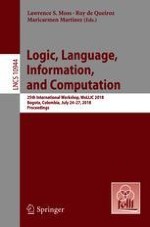2018 | Book
Logic, Language, Information, and Computation
25th International Workshop, WoLLIC 2018, Bogota, Colombia, July 24-27, 2018, Proceedings
Editors: Lawrence S. Moss, Prof. Dr. Ruy de Queiroz, Dr. Maricarmen Martinez
Publisher: Springer Berlin Heidelberg
Book Series : Lecture Notes in Computer Science
